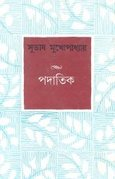 Padatik book front cover | |
| Author | Subhash Mukhopadhyay |
|---|---|
| Language | Bengali |
| Genre | Poetry |
Publication date | 1940 |
| Publication place | India |
Padatik (The Foot Soldier) first published in 1940 [1] is a Bengali book of poems written by Subhash Mukhopadhyay. This was Mukhopadhyay's first published book. [2] This book created a storm in Bengali literature. Mukhopadhyay wrote this book as a representative of a political party. [3] Mukhopadhyay in his personal life was a consistent Marxist. [4] In this book, poet showed his zeal to redeem the poor and suffering masses from exploitation. [3]